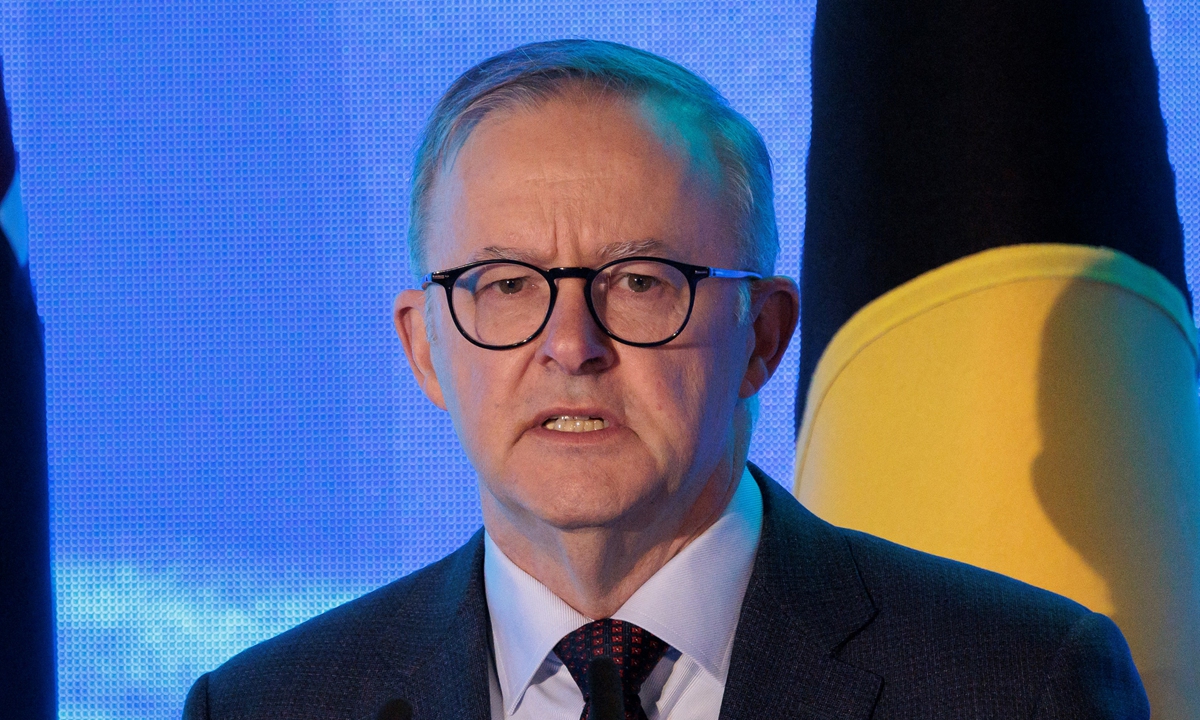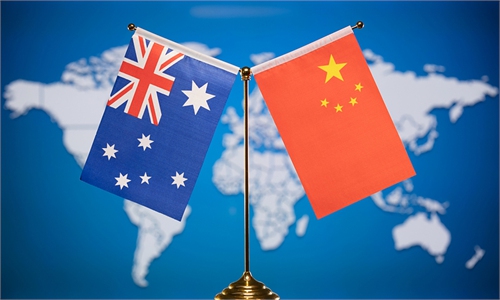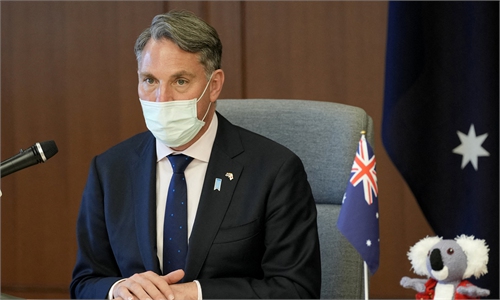China-Australia ties cannot be eased on top of ‘minefields’: Global Times editorial

Australian Prime Minister Anthony Albanese. Photo: AFP
Some US and Australian media on Tuesday hyped the news that Australian Prime Minister Anthony Albanese "rejected Beijing's four-point demands," making up a story in which Beijing put pressure on Canberra while Albanese resisted pressure and uncompromisingly refused to give in. This seems to be an affirmation for Albanese on the surface, but it actually created obstacles for the current Australian government in easing relations with China. Put another way, it is putting Canberra in a difficult position, and forcing it not to "soften its stance" toward China.The whole thing is not complicated. Chinese State Councilor and Foreign Minister Wang Yi met with Australian Foreign Minister Penny Wong on July 8 during the G20 Foreign Ministers' Meeting in Bali, Indonesia. This was the first meeting between Chinese and Australian foreign ministers in three years, which was being viewed as an important step in thawing bilateral relations. Both China and Australia believe the meeting was constructive. But obviously, some anti-China forces in the US and Australia do not want to see China-Australia relations break the ice.
During the meeting, Wang said that China hopes that Australia will seize the current opportunity, take concrete actions, reshape a correct perception of China, and reduce negative assets and accumulate positive energy for improving China-Australia relations. First, stick to regarding China as a partner rather than a rival. Second, stick to the way we get along with each other, which features seeking common ground while reserving differences. Third, stick to not targeting any third party or being controlled by any third party. Fourth, stick to building positive and pragmatic social foundations and public support. It is this four-point proposal, which is both sincere and reasonable, that has been summed up by those with an ulterior motive in the US and Australia as "Beijing's four-point demand", and prompted them to seek a response from Albanese.
In fact, this is a trap constructed by American and Western opinion, which has created the image of a "coercive" China in line with Western narratives. Albanese stressed that Australia would "respond to our own national interest" and said that "we will stand up for Australia's interests when we must." To a large extent it was yielding to the unhealthy atmosphere within Australia toward China, which was promoted and amplified by the previous Morrison government.
It needs to be emphasized that these "four points" are not "demands." Handling bilateral ties based on equality and mutual respect is not asking too much, and should be the bottom line for the two countries to handle the relationship in the right way.
And the point of "sticking to not targeting any third party or being controlled by any third party" attacked by American and Western opinion is even more inexplicable. Isn't this normal international exchange norm? On the other hand, if Australia subjects itself to the US, then China can directly deal with Washington, what's the point of developing relations with Canberra?
Nowadays, American and Western opinion is very keen to use "values" to hold Canberra captive, and Australian authorities also like to talk about "Australian interests" or "Australian values." We really hope that Australia can truly put its own national interests first, and at the same time we want to point out that it's up to Australia as to what kind of values it wants to hold and China has no intention of interfering and changing Australia's values. To be honest, Australia always emphasizes this concern, which makes China feel very strange.
Canberra fired the "first shot" in undermining China-Australia relations. Australia is the first country in the world to ban Huawei and other Chinese suppliers from providing 5G equipment, it has also served as a belligerent voice in provoking China on a series of issues related to Xinjiang, Hong Kong and Taiwan. Which of these actions that harm China-Australia relations is in Australia's actual interests? Canberra often talks about the lifting of the so-called trade sanctions against Australia, but avoids talking about China's legitimate interests and reasonable concerns.
After the current Australian government came to power, it signaled its intention to ease the relationship between the two countries, but the "landmine" fuse of bilateral relations has not been eliminated, and the normal exchanges between the two countries cannot be established on top of "minefields."
Washington is paying close attention to every move made by Canberra and inside Australia, there are also "watchful eyes". This oppressive atmosphere of domestic and foreign policies was created by the previous government. Some Australian opinion believes that in view of the tense atmosphere at home and abroad against China, the current Australian government may adopt the roundabout tactics of "one step back and two steps forward" to repair China-Australia relations, and prevent the sudden end to any rapid policy shift. But in any case, continuing the "megaphone diplomacy" of the Morrison government can only be counterproductive; it is even more hopeless to treat China-Australia relations as an appendage of US-Australia relations.
Some in the Australian media have quoted a Chinese idiom of "killing the chicken to scare the monkey" when analyzing China's policy toward Australia, believing that China is forcing Australia to yield in order to deter small neighboring countries. This opinionated view has quite a market in Australia. This view, while arrogant, is also belittling to itself. Australia is not a "chicken", and other countries are not "monkeys." China has always insisted that all countries, big or small, are equal, and adhered to mutual benefit and win-win results with all countries in the world. China's four-point proposal reflects this concept. We hope that Canberra will cherish this goodwill and meet China halfway.


